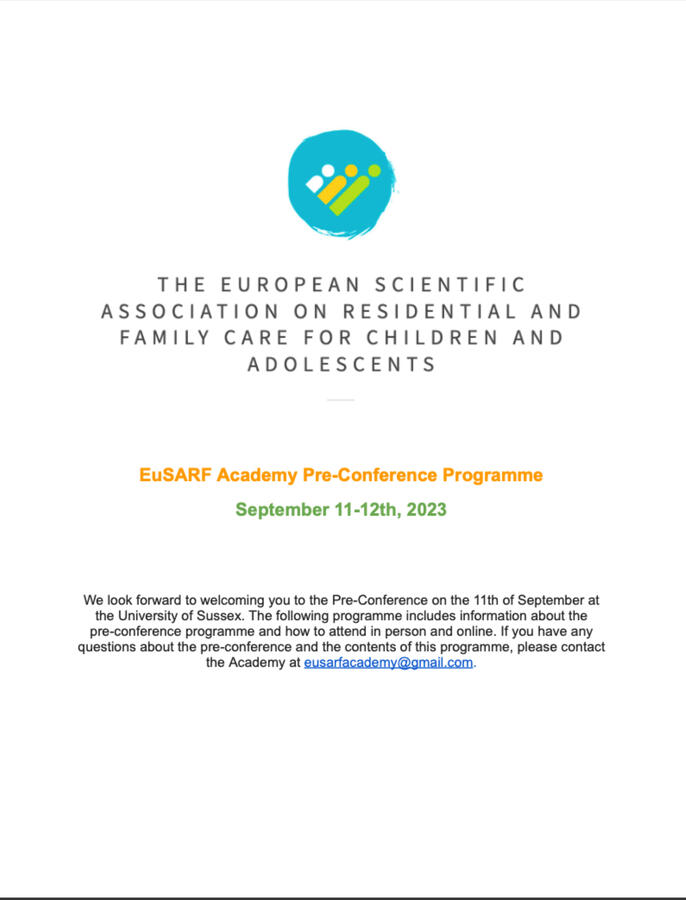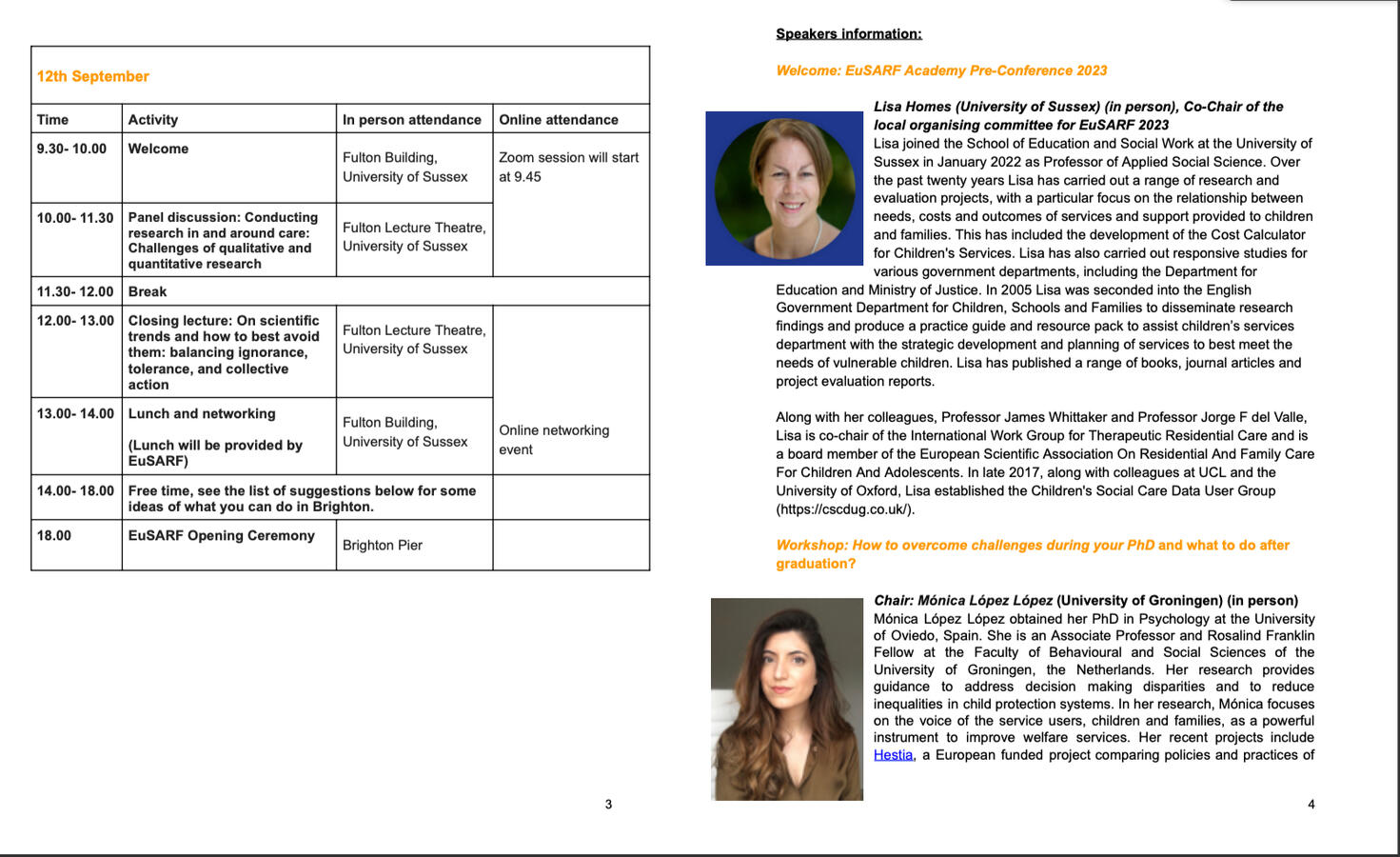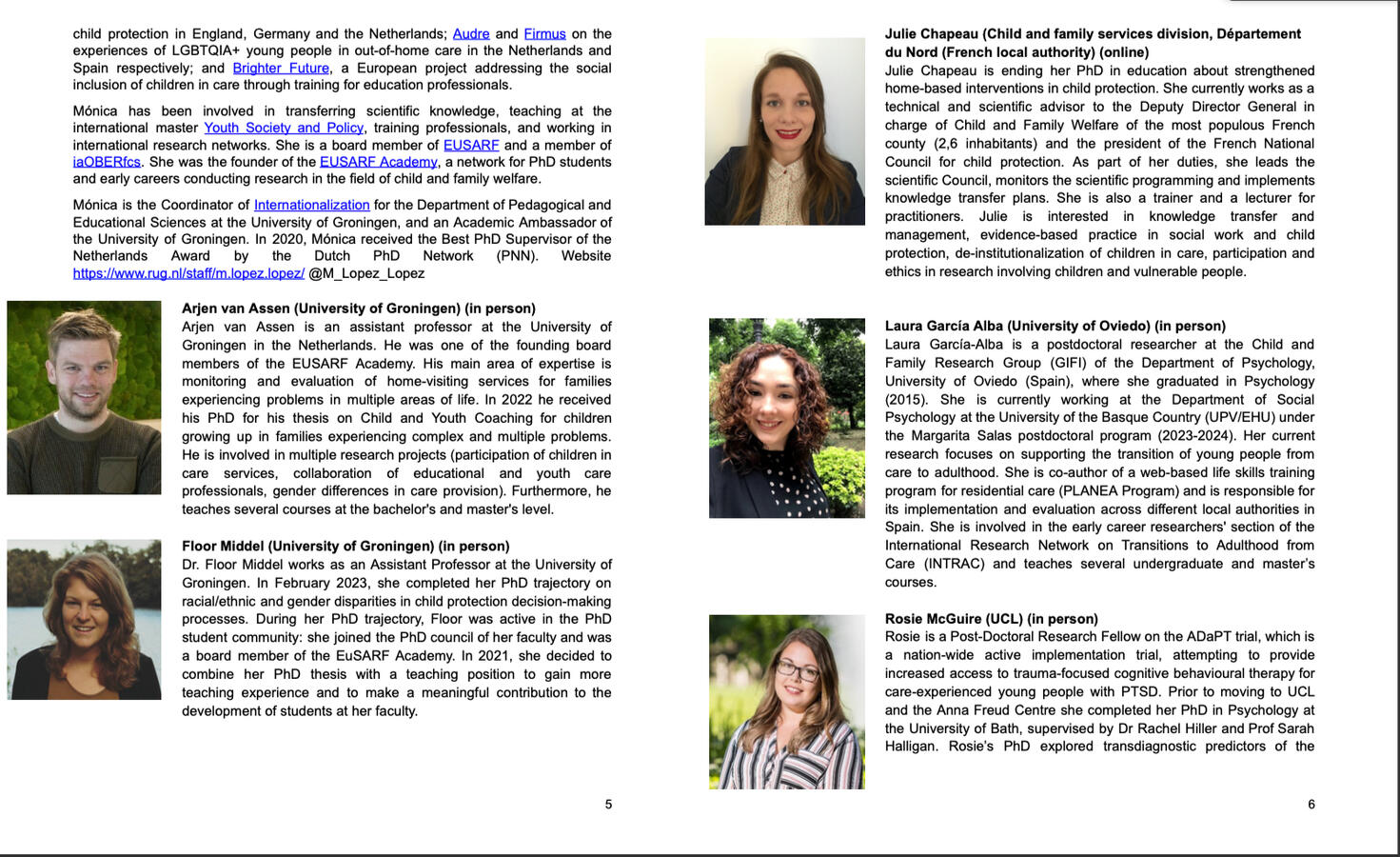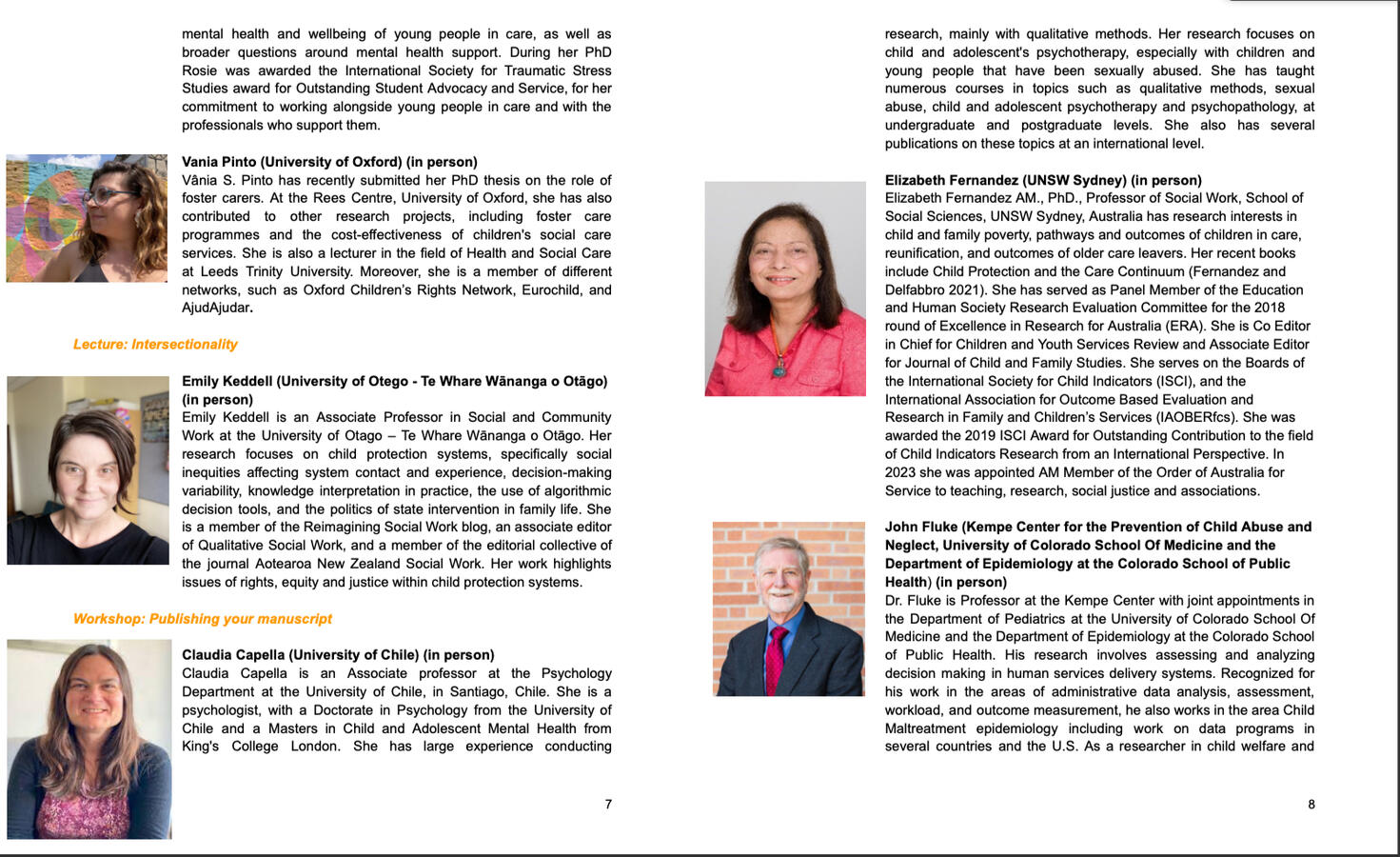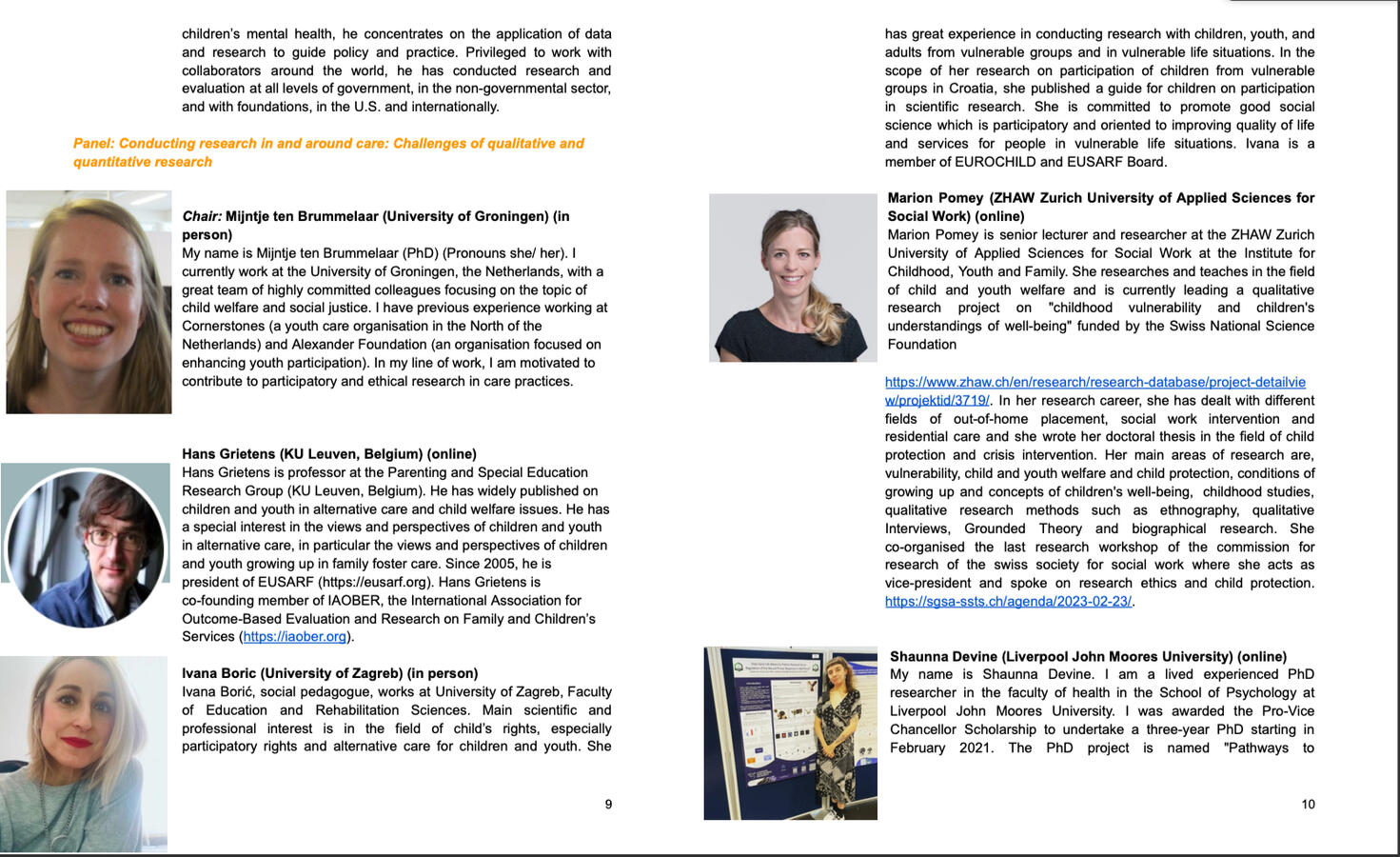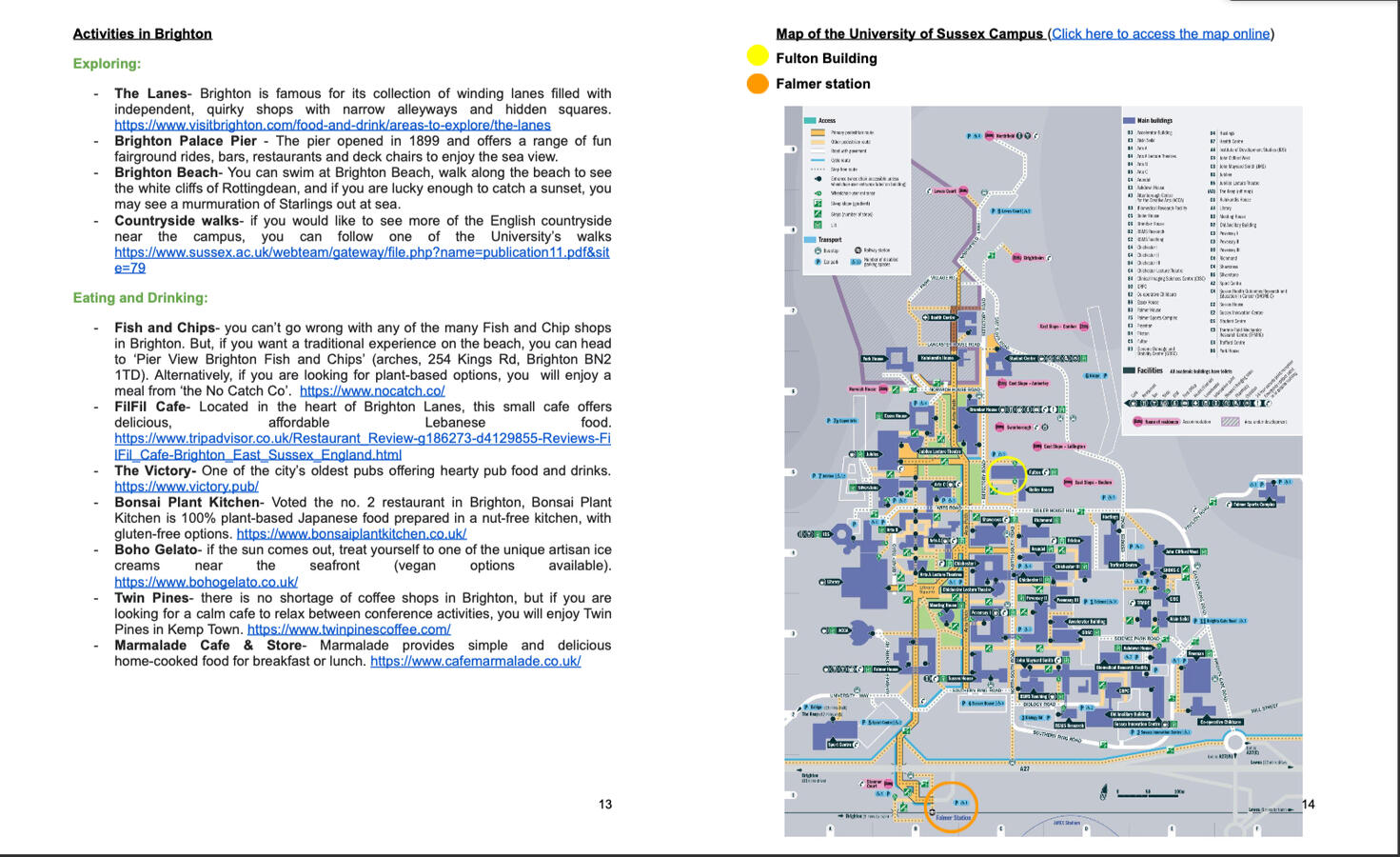
The European Scientific Association On Residential And Family Care For Children And Adolescents
EuSARF
EuSARF 2023
Opening and closing speeches by EuSARF President Hans Grietens
The conference also included a book launch, sharing the exciting new work of some incredibly talented EuSARF colleagues.You can learn about their new titles in the videos below.
Participatory Research on Child Maltreatment with Children and Adult Survivors: Concepts, Ethics, and Methods, edited by Maria Roth, Ravit Alfandari, and Gemma Crous.
The Oxford Handbook of Child Protection Systems, edited by Jill Berrick, Neil Gilbert, and Marit Skivenes.
Safeguarding Young People Beyond the Family Home: Responding to Extra-Familial Risks and Harms, edited by Carlene Firmin, Michelle Lefevre, Nathalie Huegler, and Delphine Peace.
Children's Rights to Participate in Out-of-Home Care: International Social Work Contexts, edited by Claudia Equit and Jade Purcell.
Living on The Edge: Innovative Research on Leaving Care and Transitions to Adulthood, edited by Samuel Keller, Inger Oterholm, Veronica Paulsen and Adrian van Breda.
Revitalizing Residential Care for Children and Youth: Cross-National Trends and Challenges, edited by James Whittaker, Lisa Holmes, Jorge Carlos Fernandez del Valle, and Sigrid James.
Children and Young People's Participation in Child Protection: International Research and Practical Applications, edited by Katrin Križ and Mimi Petersen.
CARE: Creating Conditions for Change, Third Edition, by Martha Holden.
We look forward to welcoming you to EuSARF 2023 at the University of Sussex.Conference registration will take place from 13h on Tuesday 12 September in the Attenborough Centre for Contemporary Arts (ACCA) on the University of Sussex campus.All the conference sessions will take place in ACCA or the Fulton building.Conference events - which are only available to those who have already booked - include:The opening ceremony at the Brighton Palace Pier, from 18-20h on Tuesday 12 September.A flight on the i360 vertical pier on Brighton seafront, arrive by 18.45h on Thursday 14 September.The conference dinner at the i360 on the Brighton seafront, arrive for 20h on Thursday 14 September.There will be an alternative gathering, open to those who are not attending the conference dinner on Thursday, September 14th, at Shelter Hall on Brighton's seafront at 7 pm. To register your interest, click the link below. No advance payment is required, but you will have to cover your own costs.To get the EuSARF 2023 App on iPhone or Android, follow the appropriate link below to download Ex Ordo and access the Ex Ordo guidebook.
Joining Us in Brighton
Don't forget your passport..
Please see links below for local and nearby accommodation, attractions and delegate deals.
- Travelling to Sussex
- Accommodation (Visit Brighton)
- Lewes Accommodation (near Brighton)
- Airbnb Brighton
- Booking.com
- Visit Brighton
- Delegate Discounts
Please contact eusarf2023@sussex.ac.uk if you require any further assistance with travel options
About EuSARF 2023
We are delighted to announce that the next EuSARF conference (EQUITY AND SOCIAL JUSTICE IN CHILD, YOUTH AND FAMILY WELFARE) will take place between 12 and 15 September 2023 and will be hosted by the School of Education and Social Work, at the University of Sussex based in Brighton, England. The conference will start with the Opening Ceremony at 6pm on Tuesday 12th September and close on Friday 15th September at 4.30pm.The conference will consider how we can:
- achieve equity and social justice in child and family welfare; and
- ensure that child protection services, including out of home care, can recognise – and work against – the different kinds of disadvantage that children, youth and families may face.Experiences of risk and trauma within and beyond the family often intersect with stigma, discrimination and social inequalities. Risk of disadvantage may be exacerbated by discrimination linked to poverty, ethnicity, gender and sexuality, as well as the stigma of child welfare intervention itself. EuSARF 2023 will address these critical themes through discussions across countries, reflecting together on the role of child welfare services in challenging inequity and enabling social justice for people whose life chances may be jeopardised by risks within and beyond the family.
Conference Programme and SpeakersPLEASE NOTE THIS PAGE MAY TAKE LONGER TO LOAD, SO PLEASE BE PATIENTThe final conference programme is below. In the case of unforeseeable changes, the most up-to-date version will be on the Ex Ordo site, which will be updated more promptly.Additionally, the Ex Ordo app is available to access the programme on your phone from the Apple and Google Play Stores:
You can read the full programme here, and scroll down for more information about our keynote speakers and invited symposia.People who are registered for the conference can also access more information on this link:
There, you can:
See each day ‘at a glance’
Click to explore sessions and read abstracts
Download the pdf programme
KEYNOTE SPEAKERS
INVITED SYMPOSIA
About EuSARF
The European Scientific Association on Residential and Family Care for Children and Adolescents (EuSARF) is a body of researchers focusing on child welfare and protection. EuSARF was founded in 1989 and has its origins in the cooperation between Flemish and Dutch universities. Currently, the EuSARF board consists of 22 members from 15 European countries and Israel, the United States of America and Canada.
EuSARF community develops scientific research in the field of child and family welfare and promotes the exchange of information between European members and other associations throughout the world. To achieve these goals, EuSARF organizes biennial international conferences and supports international seminars.
Besides organizing scientific conferences, EuSARF intends to be a network, bringing together junior and senior academics in the field of child welfare and related fields from all around the world.
EuSARF has strong and long-lasting ties with other international associations of child welfare and child protection researchers, such as the International Association for Outcome-Based Evaluation and Research on Families’ and Children’s Services (IAOBERfcs), the International Network for Foster Care Research (INFCR) and the Association Internationale de Formation et de Recherche en Education Familiale [International Association of Training and Research in Family Education (AIFREF)].
AIMS OF EUSARF
- Continuing the organization of biennial international conferences, in close collaboration with local universities, research centers, policy makers, professionals, care-experienced people, and so forth;
- Being a catalyst in Europe for researchers in the field of child welfare and stimulate colleagues to join efforts and apply for EU-funded research projects;
- Supporting specific interest groups and regional networks;
- Supporting junior researchers in Europe, for example by co-organizing events for the EuSARF PhD Academy and Summer and Winter Schools throughout Europe;
- Stimulating the exchange of bachelor and master students by setting up Erasmus Exchange networks in the field of child welfare, youth care, social work and related areas with the EuSARF board members and their universities;
- Stimulating the exchange of junior and senior researchers in the field of child welfare throughout Europe (e.g., research visits, fellowships, double doctorates);
- Communicating via website, newsletters and social media about the latest research findings and topical matters in child welfare and bringing together researchers, policy makers and professionals;
- Lobbying with officials in the European Union and stakeholders to put themes on the research agenda of the European Union that are relevant to child welfare researchers and researchers in related fields;
- Building bridges with global, national and regional associations in the field of child welfare research, such as the Society for Social Work Research (SSWR) in the United States or the International Society for the Prevention of Child Abuse and Neglect (ISPCAN).
Guidance for presenters
In person and Online guidance below
EuSARF2023 GUIDANCE FOR IN PERSON POSTER SESSIONSThe poster session
The poster session and presentations will take place on Wednesday 12 September between 4.30 and 5.30pm. This is a dedicated session in the programme, and we ask that all poster authors are available to present their posters during this time. Your poster will be displayed in the common foyer area in the Fulton Building throughout the duration of the conference, accessible to conference attendees during meals, and breaks between sessions.
When you register in person, please let the team know that you will be presenting a poster, and you will be assigned a numbered poster board, providing the specific location of where your poster should be displayed. Please ensure you have sufficient time in advance of the poster session to mount your poster. Fixings, if required, will be provided.
Please note that it is the responsibility of the author(s) to print and transport posters. If you would like to send your poster ahead of the conference, please contact the organising team (eusarf2023@sussex.ac.uk). However, the team cannot take responsibility for any posters lost in transit.
We will be running a competition for student posters, and these will be judged during the session on 12 September. The winning posters will be announced during the main conference on Thursday 13 September.
Preparing your poster:
Please review the accepted abstract and ensure that your poster aligns with the information provided. We ask that you avoid using your conference abstract on the poster, as it will already be available in the conference program. The Poster should be in portrait mode. A1 size: 23.4 inches (59.4 cm) wide x 33.1 inches (84.1 cm) high.
Word Count:
A minimum of 500 and maximum 800 words allowing viewers to fully read your poster within 10 minutes. It is essential to make your poster visually appealing and captivating to attract viewers.
The standard format for a poster includes:
Introduction
Methods
Results
Conclusions
Recommendations
General guidelines:
Include the poster board number to the top let of the poster.
The poster should be relevant to the theme of the conference, and this should be apparent to viewers.
Plan the layout of your poster in advance.
Place the title at the top and organize the content logically, starting with the introduction at the upper left, finishing with recommendations at the lower right, and filling the central space with methods and results.
Use short sentences, simple words, and bullets to illustrate your points.
Break up text with graphics, images, or photos.
Emphasize self-explanatory graphics, ensuring clarity in illustrations and tables.
Avoid jargon, acronyms, or unusual abbreviations.
Use a non-serif font (Arial) for the poster.
Ensure that the poster (text and graphics) is readable from about 2 meters away. Titles should be in large fonts (e.g., Arial >80 points).
If possible, minimize the size of institute logos or affiliations, placing them in the lower corner of the poster or next to the title.
Sections of the poster:
Introduction: Generate viewer interest in the issue or question while providing essential background information and definitions. Place the objectives of your contribution at the end of the introduction.
Methods: Be concise and precise, describing the study design, methodology and study population, and analytical approaches.
Results: Provide descriptive results briefly. Tables and graphs should stand on their own.
Conclusion and recommendations: Comment on the main results, explaining their conclusiveness and significance. Discuss any limitations and provide recommendations.
Acknowledgments/further information: Express gratitude to individuals for their specific contributions to the project and acknowledge funding sources. Include your email address for additional information.
Creating the poster:
Typically, presentation software such as PowerPoint is used. Format your PowerPoint slide to the desired print size (e.g., 90x130 cm) using the "format page" option.
You can directly insert text and graphics onto that slide or copy-paste from a Word document or another PowerPoint slide.
Creating a handout of your poster for distribution during the poster session can be helpful.
EuSARF2023 GUIDANCE FOR ONLINE POSTER PRESENTATIONSBefore the session
Please make sure that you check the final programme for your session and let the conference organisers know (eusarf2023@sussex.ac.uk) if you have any queries.
Online Poster presentations can either be live online, or pre-recorded.
The presentations will need to be a short, 4–5 minute summary of your poster.
The online poster session and presentations will take place on Wednesday 12 September between 4.30pm and 5.30pm.
All posters must be uploaded as PDF A1 files in portrait mode, to the ExOrdo system by 8th September 2023.Live Online Poster Session
One of the Conference Facilitators will open the Online Stage for you to join via ExOrdo.
Please put up your poster on the screen and ensure your presentation is accessible to the audience.
We advise against presenting a series Power Point slide. Instead, please use a single paged document designed in a poster presentation style format.
Any questions and interactions between delegates and the presenter will be facilitated by the Session Chair.Pre-recorded Poster Presentations
If you choose to pre-record your poster presentation, you may use your preferred method of recording e.g., Zoom, Teams etc.
We advise against presenting a series power point slides. Please use a single paged document designed in a poster presentation style format.
Please upload your (i) pre-recorded poster presentation video no longer than 5 minutes and (ii) the PDF file A1 file in portrait mode, to the ExOrdo system by 8th September 2023.
Pre-recorded presentations will be played by the Session Chair on 12th September between 4.30pm-5.30pm via the ExOrdo system, so please ensure these are uploaded by the deadline (8th September 2023).
As with the printed posters displayed throughout the conference, recorded posters will be played in a dedicated space throughout the conference.
Student Poster Competition
We will be running a competition for student posters. Student posters will be judged during the session on 12 September 2023.
If you are a student, taking part in the poster competition and would like to send your poster for printing ahead of the conference, please contact the organising team (eusarf2023@sussex.ac.uk). However, this service is exceptionally offered to students entering the competition.
If you pre-recorded your poster, attending and engaging with the online session on Wednesday 12 September between 4.30 and 5.30pm will enable the judges to see your presentation and ask any questions.
The winning posters will be announced during the main conference on Thursday 13 September 2023.
Preparing your poster:
Please review the accepted abstract and ensure that your poster aligns with the information provided. We ask that you avoid using your conference abstract on the poster, as it will already be available in the conference program. The Poster should be in portrait mode. A1 size: 23.4 inches (59.4 cm) wide x 33.1 inches (84.1 cm) high.Word Count:
A minimum of 500 and maximum 800 words, allowing viewers to fully read your poster within 10 minutes. It is essential to make your poster visually appealing and captivating to attract viewers.
The standard format for a poster includes:
Introduction
Methods
Results
Conclusions
Recommendations
General guidelines:
Include the poster board number to the top let of the poster.
The poster should be relevant to the theme of the conference, and this should be apparent to viewers.
Plan the layout of your poster in advance.
Place the title at the top and organize the content logically, starting with the introduction at the upper left, finishing with recommendations at the lower right, and filling the central space with methods and results.
Use short sentences, simple words, and bullets to illustrate your points.
Break up text with graphics, images, or photos.
Emphasize self-explanatory graphics, ensuring clarity in illustrations and tables.
Avoid jargon, acronyms, or unusual abbreviations.
Use a non-serif font (Arial) for the poster.
Ensure that the poster (text and graphics) is readable from about 2 meters away. Titles should be in large fonts (e.g., Arial >80 points).
If possible, minimize the size of institute logos or affiliations, placing them in the lower corner of the poster or next to the title.
Sections of the poster:
Introduction: Generate viewer interest in the issue or question while providing essential background information and definitions. Place the objectives of your contribution at the end of the introduction.
Methods: Be concise and precise, describing the study design, methodology and study population, and analytical approaches.
Results: Provide descriptive results briefly. Tables and graphs should stand on their own.
Conclusion and recommendations: Comment on the main results, explaining their conclusiveness and significance. Discuss any limitations and provide recommendations.
Acknowledgments/further information: Express gratitude to individuals for their specific contributions to the project and acknowledge funding sources. Include your email address for additional information.Creating the poster:
Typically, presentation software such as PowerPoint is used. Format your PowerPoint slide to the desired print size (e.g., 90x130 cm) using the "format page" option.
You can directly insert text and graphics onto that slide or copy-paste from a Word document or another PowerPoint slide.
Creating a handout for your poster could be helpful. You can upload this alongside your poster and recording on ExOrdo.
And finally…
If you have any questions about your presentation, email, eusarf2023@sussex.ac.uk and title your message ‘Poster Online Query.’
If you have any issues with any aspect of your presentation on the day, please contact one of the Conference Facilitators at eusarf2023@sussex.ac.uk, and they can arrange how best to help you.
EuSARF2023 GUIDANCE FOR ONLINE ORAL PRESENTATIONS & ONLINE SYMPOSIABefore the session
Please make sure that you check the final programme for your session and let the conference organisers know (eusarf2023@sussex.ac.uk) if you have any queries.
Online presenters may opt to present live or pre-recorded talks.
All presentations should be 8-10 minutes, consistent with in-person presentation guidelines.Should you opt to pre-record your presentation, you can utilise PowerPoint as your main recording platform or incorporate PowerPoint presentations alongside your preferred method of recording (e.g., Zoom, Teams etc.).
Please ensure you upload pre-recorded presentations and accompanying slides to the ExOrdo system by 8th September 2023.
PresentationsIn advance of the session, we encourage you to test the Exordo Online Stage and your computer set up to ensure you can access this
Before the session starts, one of the Conference Facilitators will open the Online Stage
Please join the online Stage via ExOrdo using the name used to register your abstract, this will enable the Session Chair to confirm you are in attendance
The session will commence promptly, with the Session Chair introducing each speaker and the title of their presentation before they begin delivering their talk
The Session Chair may provide a signal when there is a short time remaining, enabling you to adhere to the allocated time. This will be done in an agreed approach that does not interrupt your talk
If you have a pre-recorded presentation, the Session Chair will assist with accessing and playing any pre-recorded presentations via the ExOrdo system
The Session Chair will also facilitate any questions from delegatesTiming
Each online paper session or symposium is 90 minutes in length.
This allows a maximum of six 15-minute slots within each session.
Presentation must be 8-10 minutes long
There will be 5 minutes for questions and discussions
The chair will assist with time keeping, facilitation of discussions and smooth running of each session
Where there are fewer than six papers in a session, the chair may assist with managing session discussions and timings
Discussion and questions
Each session of individual papers has been organised to group papers with related themes/interests. The organising team are keen to foster discussion across papers within each session, as well as building opportunities for conference attendees to share ideas and build new connections. With that in consideration, the Session Chair will encourage and facilitate discussion between presenters and delegates. We ask all presenters to remain logged in and present to engage with this discussion as it is focused on all papers presented in that session.And finally…
If you have any questions about your presentation, email, eusarf2023@sussex.ac.uk and title your message ‘Poster Online Query.’
If you have any issues with any aspect of your presentation on the day, please contact one of the Conference Facilitators at eusarf2023@sussex.ac.uk, and they can arrange how best to help you.
EuSARF2023 GUIDANCE FOR IN-PERSON ORAL PRESENTATIONS & IN-PERSON SYMPOSIA
Before the session
Please make sure that you check the final programme for your session and let the conference organisers know (eusarf2023@sussex.ac.uk) if you have any queries.
Please upload your Power Point slides to the ExOrdo system by 8th September 2023. These will be made available for delegates to view.
Presentations
Speakers will be unable to use their own laptops to avoid technical challenges and disjoining the program. We ask all speakers to kindly use the equipment provided on campus and utilise the instructions below.
Please ensure Power Point presentations are ready either on a USB drive or stored on an accessible online platform such as Google Drive or Dropbox. This will allow you to readily share your presentation with the Session Chair.
If your presentation includes video files, please ensure these video files are saved separately on your USB drive or accessible online platform.
We ask that speakers arrive at their rooms five minutes before the session starts to meet the Session Chair, familiarise with the room, prepare, ensure comfort and make ready their presentation.
There will be Campus Ushers to help you find your way around campus and presentation room
If you have any questions, kindly ask the Session Chair.
Sessions will begin promptly.
Timing
Each in-person paper session or symposium is 90 minutes in length.
This allows a maximum of six 15-minute slots per paper within each session.
Your presentation must be 8-10 minutes long
There will be 5 minutes for questions and discussion.
The Session Chair will assist with facilitation and smooth running of the session.
Session chairs may utilise signs to signal timings to you
e.g. 3 minutes, 1 minute, and STOP.
If there are fewer than six papers in your session, the chair will assist with managing timings of presents and discussions.
Hybrid sessions
All presenters are required to deliver their presentation live during the designated time-slot in the programme.
Remote speakers will utilise the Zoom platform for their presentations. A Zoom link will be provided by the Session Chair or one of the Conference Facilitators on the day.
It is advised to join the session at least 10 minutes prior to the scheduled time and ensure that your microphone and video is tested to facilitate a punctual start.
Live streaming of the sessions will be provided to all participants in the presentation room.
When prompted by the Session Chair at the beginning of the session, please identify yourself as a presenter, and enable your video (if feasible) during your presentation to enhance engagement with delegates.
Adherence to the allocated time limits is crucial; kindly avoid surpassing the expected duration of your presentation during the live talk.
Discussion and questions
Each session of individual papers has been organised to group papers with related themes/interests. The organising team are keen to encourage discussion across papers within each session as well as building opportunities for conference attendees to share ideas and build new connections. With that in consideration, the chair will encourage and facilitate discussion between presenters and delegates. We ask all presenters to remain in the room, logged in (for those online) and present, to engage with this discussion as it is focused on all papers presented in that session. Your active engagement will contribute to the success of the conference sessions.And finally…
If you have any questions about your presentation, email eusarf2023@sussex.ac.uk and title your message ‘Oral In-person Query’.
If you have any issues with any aspect of your presentation on the day, please speak to one of the Conference Facilitators or Reception Desk (who will be wearing a EuSARF t-shirt) and they can arrange how best to help you.
EUSARF CONFERENCES AND EVENTS
Since the late 1980s, EUSARF has organized multiple international conferences:
- 1989, November 30–December 2, De Haan (Belgium). ‘Innovations in Residential Care’
- 1991, November 7–9, Noordwijkerhout (the Netherlands). ‘Social Competence and Social Support’
- 1993, September 29–October 2, Lüneburg (Germany). ‘Love Is Not Enough’
- 1995, September 6–9, Leuven (Belgium). ‘There Is No Place Like Home. Supporting Children in Need and Their Families’
- 1996, September 12–14, London (Great Britain). ‘Action for Children. Linking Research, Practice and Policy across Europe’
- 1998, September 23 – 26, Paris (France). ‘Residential and Foster Care: New Approaches, New Practices’
- 2000, May 10–13, Maastricht – in cooperation with FICE ‘The Century of the Child. Changes in Views on (Residential) Child and Youth Care. Retrospect and Perspectives
- 2002, September 11–14, Trondheim (Norway). ‘Revitalising Residential and Foster Care: New Horizons in the 21th Century’
- 2003, April 9–12, Leuven (Belgium). ‘In the Best Interests of the Child: Cross-Cultural Perspectives’
- 2005, September 21–24, Paris (France). ‘Troubled Children in a Troubled World’
- 2008, March 26–29, Padova (Italy). ‘Assessing the ‘Evidence-Base’ of Intervention for Vulnerable Children and Their Families, Cross National Perspectives and Challenges for Research, Practice and Policy’
- 2010, September 22–25, Groningen (the Netherlands). ‘How Interventions in Child and Family Care Work. Research and Practice-Based Findings on Interventions Regarding Vulnerable and Troublesome Children and Their Families’
- 2012, September 3–7, Glasgow (Scotland). ‘All Our Children. Positive Experiences, Successful Outcomes for Looked After and Other Vulnerable Children’
- 2014, September 2–5, Copenhagen (Denmark). ‘Making a difference’
- 2016, September 13–16, Oviedo (Spain). ‘Shaping the future’
- 2018, October 2–5, Porto (Portugal). ‘All Children, All Families. Promoting Excellence in Child Welfare Research, Policy and Practice’
- 2021, September 1–3, Zürich (Switzerland). ‘The perspective of the Child’
- 2023, September 12-15, Brighton (UK). 'Equity and Social Justice in Child, Youth and Family Welfare'.
** Besides conferences, EuSARF has organized other international events:**
- 2017, August 21 – 25, Groningen (the Netherlands). Summer School ‘The Future of Child and Family Welfare Policy: Looking Through Different Lenses’ from 21 to 25 August 2017.
- 2018, August 14 – 15, México City (México). International Conference ‘The Future of Child Protection’.
BOARD MEMBERS
- Hans Grietens (President)
- Andrew Kendrick
- Annemiek Harder
- Bernadette Tillard
- Daniela Reimer
- Hélène Join-Lambert
- Harriet Ward
- Ivana Borić
- Jim Anglin
- Jill Duerr Berrick
- Johan Vanderfaeillie
- Jorge Fernandez del Valle
- Lisa Holmes
- Maria Barbosa Ducharne
- Mette Lausten
- Mónica López López
- Robbie Gilligan
- Shalhevet Attar-Schwartz
- Shlomo Romi
- Tarja Pösö
- Tiziano Vecchiato
EuSARF Academy
The EUSARF Academy is an internationally active network of PhD students and early career researchers. We aim to promote career development and international cooperation within the field of child and family care. As part of the European Scientific Association on Residential & Family Care for Children and Adolescents (EUSARF) one of our main activities is organizing Pre-Conferences that specifically address PhD students and early career researchers who also attend EUSARF Conferences.
Follow the EUSARF ACADEMY
Journals
Open Access Archive of the International Journal of Child and Family Welfare
Contact
Follow EuSARF on Twitter, Facebook or LinkedInor email eusarf2023@sussex.ac.uk
